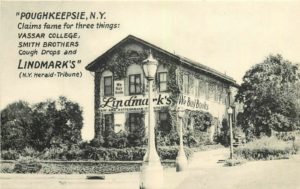 Lindmark’s Bookstore began with John Lindmark, who purchased a rare book for $300 and sold it for $ 7,000. That was all it took. From then on, John and his wife Rae were hooked on books, moving to Poughkeepsie and setting up their first bookstore on Liberty Street in 1912.
Lindmark’s Bookstore began with John Lindmark, who purchased a rare book for $300 and sold it for $ 7,000. That was all it took. From then on, John and his wife Rae were hooked on books, moving to Poughkeepsie and setting up their first bookstore on Liberty Street in 1912.
Driven by their love for books, John and Rae soon found their first location on Liberty Street too small to contain their growing collection. They moved to a larger space, and then to an even larger one at 290 Main Street in 1933, and finally to the old Christopher Columbus schoolhouse on Church Street.
By 1945, Lindmark’s Bookstore had amassed an impressive collection of around 300,000 books, valued at approximately $ 2 million. This vast inventory required 14 miles of shelving, making it larger than the combined collections of all the area libraries.
In 1961, the City of Poughkeepsie planned to construct a cloverleaf interchange for the Mid-Hudson Bridge. This meant that the state would have to take Union Square, Harris Street, South Clover Street, and Church Street. Lindmark’s Bookstore was right in the middle of these plans. The state offered Lindmark $22,000, but nothing for the transport and storage of his massive book collection.
Mr. Lindmark was a hot-tempered and stubborn individual when it came to business dealings and negotiations. So, when the state offered him $3,000 toward the relocation and storage of his books in 1963, he declined. Several local institutions offered to assist with relocation and storage, but their offers were also rejected. Lindmark stubbornly insisted that the state shoulder the entire cost. The state would not agree, and eventually, a court order was handed down. In April of 1963, the books were removed from the building and placed on the street.
This pile-up of books became a public spectacle, with not only the public contributing to the loss and scattering of many books, but the weather also played a role in destroying many of them. Ultimately, the city had had enough, and the remaining books were piled up and disposed of by the most convenient method: burning.
The Sojourner
Ad
Share this!
072624
